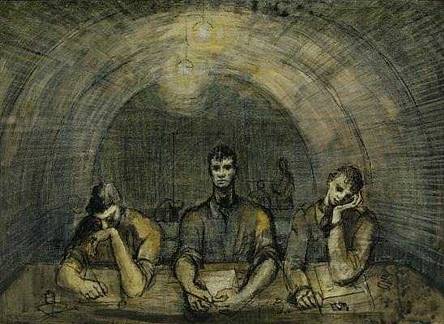|
6th may 2004
 Three things only have been discovered of that which concerns the inner consciousness since before written history began. Three things only in twelve thousand written, or sculpted, years, and in the dumb, dim time before then. Three ideas the Cavemen primeval wrested from the unknown, the night which is round us still in daylight - the existence of the soul, immortality, the deity. These things found, prayer followed as a sequential
result. Since then nothing further has been found in all the twelve thousand
years, as if men had been satisfied and had found these to suffice. They do
not suffice me. I desire to advance further, and to wrest a fourth, and even
still more than a fourth, from the darkness of thought. I want more ideas of
soul-life. I am certain that there are more yet to be found. A great
life - an entire civilisation - lies just outside the pale of common thought.
Cities and countries, inhabitants, intelligences, culture - an entire
civilisation. Except by illustrations drawn from familiar things, there is
no way of indicating a new idea. I do not mean actual cities, actual civilisation.
Such life is different from any yet imagined. A nexus of ideas exists of
which nothing is known - a vast system of ideas - a cosmos of thought. There
is an Entity, a Soul-Entity, as yet unrecognised. These, rudely expressed,
constitute my Fourth Idea. It is beyond, or beside, the three discovered by
the Cavemen; it is in addition to the existence of the soul; in addition to
immortality; and beyond the idea of the deity. I think there is something
more than existence.
9th may 2004
rain Woman (at Edwardian country houseparty, gazing out of window): You poor men; what a day!
13th may 2004
Tuesday. Mme. L'Obscurier in peevish mood all day - the cook has resigned.
There have been Bolshevik noises from the kitchen ever since I started sending down sketches for Proposed Contemporary Suppers. "The last straw" was apparently my blueprint for an International Pie. I envisioned a simple pie raised on equidistant reinforced potato stilts, its open-plan filling enabled by structurally independent pastry. Large, horizontal "windows" are incised with a pastry hawk. There is a roof garden of broccoli florets and miniature abstract carrot art. But - no. Of course, we must have instead irregular chops, themeless ratatouille, and tantrums.
20th may 2004
swaddled in white Prospero: Poor worm, thou art infected! This visitation shows it. He means his daughter, who is falling in love with Ferdinand: the notes in the Arden edition point you to the OED: Worm, n.: A human being likened to a worm or reptile as an object of contempt, scorn, or pity; an abject, miserable creature. With qualification expressing tenderness, playfulness, or commiseration: A human being, 'creature'. Obs. (In 16th c. esp. loving worm.) Which reminds you of Steinbeck's friend Ed Ricketts, who admired worms of all kinds and found them so desirable that, searching around for a pet name for a girl he loved, he called her "Wormy." She was a little huffy until she realized that he was using not the adjective but the diminutive of the noun. His use of this word meant that he found her pretty, interesting, and desirable. But still it always sounded to the girl like an adjective.
Plus the words worm and tempest bring to mind Blake's invisible worm in the howling storm, a rather less sympathetic creature.
21st may 2004
ne tirez pas sur le pianiste In France they kiss on Main Street - but they'd rather be in Peoria. France's love affair with all things American dates back to the end of the First War, and it's still firing on all cylinders. The cult of celebrity, the claiming of figures such as Chaplin ('Charlot') or Jerry Lewis ('Le Roi du Crazy') continues. In small provincial towns the longing to escape to Broadway or Hollywood is sometimes so intense that the very infrastructure trembles. Certain celebrities (even those beached on the shores of the infomercial) attract such volumes of fan-mail that the post office has trouble coping with the phenomenon, and has to adjust its working practices:
24th may 2004
God, Satan, Paradise and Hell all vanished one day in my fifteenth year, when I quite abruptly lost my faith. I recall it vividly. I was at school in England by then. The moment of awakening happened, in fact, during a Latin lesson, and afterwards, to prove my new-found atheism, I bought myself a rather tasteless ham sandwich, and so partook for the first time of the forbidden flesh of the swine. No thunderbolt arrived to strike me down. I remember feeling that my survival confirmed the correctness of my new position. I did slightly regret the loss of Paradise, though. The Islamic heaven, at least as I had come to conceive it, had seemed very appealing to my adolescent self. I expected to be provided, for my personal pleasure, with four beautiful female spirits, or houris, untouched by man or djinn. The joys of the perfumed garden; it seemed a shame to have to give them up.
From that day to this, I have thought of myself as a wholly secular person, and have been drawn towards the great traditions of secular radicalism - in politics, socialism; in the arts, modernism and its offspring - that have been the driving forces behind much of the history of the twentieth century. But perhaps I write, in part to fill up that emptied God-chamber with other dreams. Because it is, after all, a room for dreaming in. - Salman Rushdie, In God We Trust
25th may 2004
- Keith Vaughan, Nissen 1942
|
|



it's night and somebody's pushing his mower home to the moon
- Alice Oswald